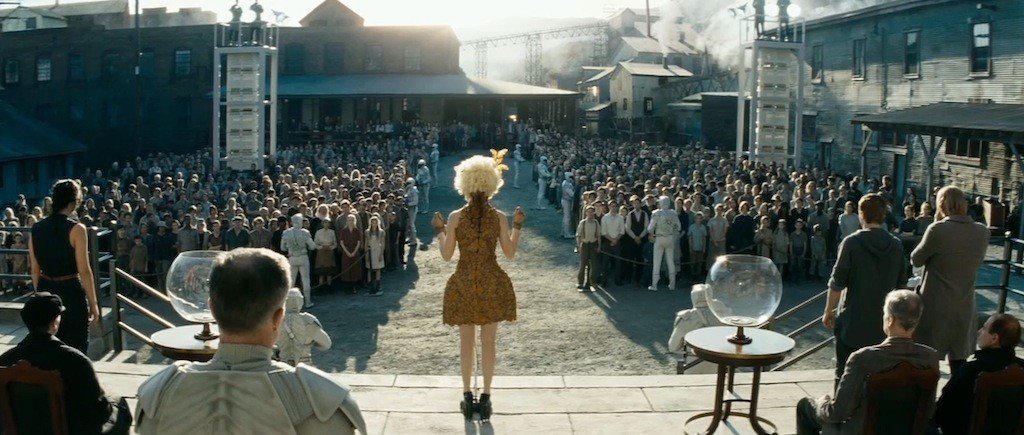Labor & Economy
Hollywood’s Incentive Games

In The Hunger Games, the rich and politically powerful rulers of the capital city Panem force young people from 12 districts to fight against each other. The Games serve the interests of the ruling elite by ensuring a quiescent populace remains that way, while 23 of the 24 young combatants are meant to wind up dead.
Good dystopian sci-fi holds up a mirror to reality, sometimes despite itself. It is unlikely that either trilogy author Suzanne Collins or Lionsgate – the producer and distributor of the film series – had Hollywood in mind, but the films provide an excellent description of the economics of today’s movie industry, as states compete with each other to give away ever more taxpayer dollars in exchange for jobs that, in some cases at least, they don’t even get.
As a new LAANE report details, every year approximately 40 U.S. states give away $1.7 billion to film and television producers in tax credits and other incentives to lure productions to their states. The studios pit state against state to get the best deal, all in the name of job creation, yet no jobs are truly created: studios simply move jobs around the map, collecting billions of taxpayer dollars as they go from California to Louisiana, from New York to New Mexico. The first Hunger Games movie was shot in North Carolina to take advantage of taxpayer-financed incentives, but loyalty is short-lived in Hollywood: The next two movies went to Georgia after the Peach State put more money on the table.
Lionsgate is in fact an industry leader at taking advantage of taxpayer largesse, accepting $331 million in public money over the past four years. The company posted a $260 million operating profit in 2013 and its stock has increased more than 400 percent in the past five years, in part because it plays the incentive game so well. The CEO, Jon Feltheimer, saw his compensation package increase from $12.6 million in 2013 to $66.3 million in 2014, a staggering 427 percent one-year increase. While Hollywood studios play their incentive game, taxpayers-cum-producers pick up the tab and workers suffer as already-precarious, project-based employment becomes that much more precarious.
The race to the bottom hurts workers throughout the film and television industry, but few groups of workers are hurting as much as the freelance musicians who record the scores to these movies and shows. Session wages for Hollywood musicians are now down more than two-thirds – from about $50 million to $15.5 million – since the incentive games began. Historically these were good jobs, mainly based in Southern California, providing work to thousands of musicians who got solid wages, health care and a pension. Musicians’ income helped to bolster our regional economy, and musicians came to L.A. from around the world, helping make L.A. one of the U.S.’s great music cities. This is all now slipping away. Scores are increasingly recorded overseas, mostly in London (with its generous subsidies) and Eastern Europe (with its low wages).
While the tax credit race has reduced quality employment for all workers, post-production workers such as musicians have less bargaining power (visual effects workers are similarly affected); long-established working standards for musicians are deteriorating faster than those of actors, writers, directors, or most craft, technical, and service workers. And we’re talking about relatively piddling amounts of money. The total cost of musicians on a typical film is about one-half of one percent of a film’s production budget; by shifting work to a low-road country, a studio saves perhaps half of that amount. This means that on a $65 million film, a studio may save about $143,000, but at a cost of nearly $1.2 million to our regional economy. To compound the injury, as taxpayers we are now frequently paying – through these incentive programs – for the privilege to ship good jobs overseas.
These are not forces of nature wiping out quality employment. These are deliberate decisions made by people – people like Lionsgate’s Jon Feltheimer, and many others at many studios. People who apparently believe that hundreds of millions – or billions – of dollars are not enough profit, and that it is acceptable to eke out still more profit by ruining lives, reducing employment, hurting domestic economies and chipping away at the cultural life of the city. Our report “Keeping the Score” details these harms, yet also notes how policy-makers can begin to address them.
The report also calls on the industry to take the high road, but we’re not holding our breath: when you write the rules of the game, the odds are ever in your favor.
(Jon Zerolnick is LAANE’s Research Director.)

-

 Column - State of InequalityJanuary 22, 2026
Column - State of InequalityJanuary 22, 2026On Eve of Strike, Kaiser Nurses Sound Alarm on Patient Care
-

 Latest NewsJanuary 16, 2026
Latest NewsJanuary 16, 2026Homes That Survived the 2025 L.A. Fires Are Still Contaminated
-

 The SlickJanuary 20, 2026
The SlickJanuary 20, 2026The Rio Grande Was Once an Inviting River. It’s Now a Militarized Border.
-

 Latest NewsJanuary 21, 2026
Latest NewsJanuary 21, 2026Honduran Grandfather Who Died in ICE Custody Told Family He’d Felt Ill For Weeks
-

 The SlickJanuary 19, 2026
The SlickJanuary 19, 2026Seven Years on, New Mexico Still Hasn’t Codified Governor’s Climate Goals
-

 Latest NewsJanuary 22, 2026
Latest NewsJanuary 22, 2026‘A Fraudulent Scheme’: New Mexico Sues Texas Oil Companies for Walking Away From Their Leaking Wells
-

 The SlickJanuary 23, 2026
The SlickJanuary 23, 2026Yes, the Energy Transition Is Coming. But ‘Probably Not’ in Our Lifetime.
-

 The SlickJanuary 27, 2026
The SlickJanuary 27, 2026The One Big Beautiful Prediction: The Energy Transition Is Still Alive

